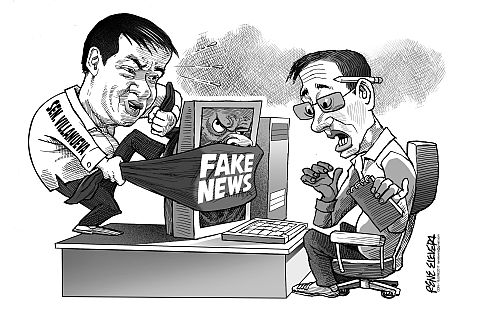
A proposed bill by Sen. Joel Villanueva to penalize those spreading fake news on social media and the web may already be covered under existing laws that, at the time they were crafted, had not yet even considered the possibility of a World Wide Web.
Still, the senator’s proposed bill gains currency in light of Justice Secretary Vitaliano Aguirre II’s erroneous claim that a meeting between Sen. Bam Aquino and other opposition officials with local leaders in Marawi City last May 1 supposedly sparked the terrorist attack in the city.
The Justice secretary’s basis for the claim is said to have been a photo of one of the officials — dated two years ago — that was posted on a Facebook page of a loyalist of President Rodrigo Duterte.
Aguirre had covered up his blunder by claiming that he was misquoted by media, and ordered the National Bureau of Investigation (NBI) to investigate reports of destabilization efforts against the Duterte administration.
Would the investigation include those who exposed his blunder and the netizens who berated him for his failure of intelligence? Then again, it won’t be a surprise if Aguirre based his erroneous claim on information fed to him by those close to the President.
Wasn’t it just a while ago when Mocha Uson, newly minted assistant secretary of the Presidential Communications Operations Office (PCOO), posted on Facebook a photo of foreign soldiers praying and made it appear that they were Filipino soldiers?
This development came as Aangat Tayo Party-list lawmaker Harlin Abayon III called on media outlets and the National Union of Journalists in the Philippines (NUJP) to produce a registry of media practitioners in order to differentiate between legitimate media practitioners and those posing as such who were spreading fake news.
While the merit of her proposal is up for debate, we wonder if that same registry can be used to target these same media practitioners for the filing of libel charges and other forms of harassment by those who find offense in their work regardless of whether or not they were done in accordance with the highest professional and ethical standards of journalism.
Incidentally, NUJP and the Center for Media Freedom and Responsibility launched Fakeblok, a Google Chrome plug-in aimed at removing and sanitizing one’s news feed of fake news.
And in filing the proposed bill against fake news, we hope Senator Villanueva includes public officials who issue erroneous claims to the public based on questionable information from social media or their so-called “intelligence reports” as among those to be penalized or sanctioned.
We hope the bill will actually zero in on the purveyors of black propaganda whether in a private or official capacity.